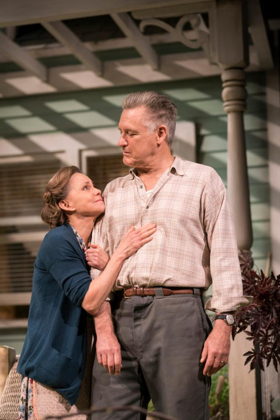Review: ALL MY SONS, Old Vic
|
![]() London's latest foray into Arthur Miller has serious transatlantic star power, with its leading quartet of Bill Pullman, two-time Oscar-winner Sally Field, Colin Morgan and Jenna Coleman. However, Jeremy Herrin's Old Vic/Headlong co-production is surprisingly understated, with the play's politics, rather than its passions, really shining through.
London's latest foray into Arthur Miller has serious transatlantic star power, with its leading quartet of Bill Pullman, two-time Oscar-winner Sally Field, Colin Morgan and Jenna Coleman. However, Jeremy Herrin's Old Vic/Headlong co-production is surprisingly understated, with the play's politics, rather than its passions, really shining through.
 Miller's 1947 breakthrough work is inspired by a true story about an aeronautical corporation which allowed defective engine parts to be installed in military planes.
Miller's 1947 breakthrough work is inspired by a true story about an aeronautical corporation which allowed defective engine parts to be installed in military planes.
In the play, that company belongs to self-made businessman Joe Keller, although it's his former partner, Steve, who went to prison after their firm dispensed cracked cylinder heads, leading to the deaths of 21 Second World War pilots; Joe was exonerated.
Joe's pilot son, Larry, is missing in action, although his mother Kate fiercely maintains that he's alive. That's a barrier for younger son Chris, who's in love with Larry's former sweetheart Ann - daughter of the imprisoned Steve.
It's a superbly crafted powder keg of a play, just waiting for the arrival of the lit match in the form of Ann's brother George, who carries key information. But the first half of Herrin's production is rather muted, led by Pullman's unusually laconic Joe.
It's an interesting characterisation if we read it as at least partly an act - the rumpled, twinkly-eyed patriarch fending off problems with his folksy shtick. He's a charmer playing make-believe with a neighbouring small boy, Bert, though his easy deception also acts as a red flag.
Pullman is certainly effective in the second half, as Joe's lies unravel in a torrent of self-justifications - both pitiful and alarming. But his mumbled speech swallows many of Miller's lines, and his intimate performance may not translate to the whole theatre.
It's also a slightly odd fit with Field's electrifying turn as Kate, vividly articulating every step of her tragic journey. Her whole body shakes as she recalls Larry's tree falling in the previous night's storm, and she constantly bows and hugs herself protectively, as though fending off invisible blows.
But Field also shows how Kate's pain has given her power, emotionally manipulating everyone around her. Her too-bright homemaker smile and stream of endearments are sometimes horrifyingly paired with absolute ruthlessness, often directed at Ann, the threat to her fantasy world. The climactic reveal of her complicity, and heart-wrenching justification, makes the blood run cold. Field is simply unmissable.
Both Morgan and Coleman have some accent issues, and the former never quite convinces as someone whose glowing virtue has such a significant effect on others, but there is a clear sense that this generation carries the real legacy of grief, loss and moral compromise. They're defined by a palpable absence; Ann, bewildered, notes that Larry's shoes are not just kept, but "shined".
Coleman, making her stage debut, is more effective when Ann is tenacious than sweetly tremulous - though that's partly the writing of her character, constantly ogled and objectified until she starts to define her own role. At best, she's a partner for Morgan in voicing their sense of collective responsibility, which has some resonance in today's generational divide over issues like climate change.
The subplots here work particularly well in supporting the play's driving ideas, with Sule Rimi and Kayla Meikle excellent as the doctor and his wife, wryly vocalising the tension between idealism and financially supporting a family - and showing, too, how moral compromise spreads like a disease, since they know about Joe's criminal act, but decline to disrupt this suburban harmony.
There's also a shattering moment between Oliver Johnstone's stirringly intense George - torn between two persuasive father figures, and between the lure of "home" and a difficult but just path - as he encounters his childhood sweetheart Lydia (a luminous Bessie Carter), and the pair flash back to what was and what might have been.
It makes clear that Joe's actions - though he defends them as providing for his family - in fact stole something fundamental from them, just as the war snatched so many possibilities from this ravaged generation.
There's more contemporary resonance, too, with Joe framing it as hard-working people versus an educated elite who think too much. But with no thought of others comes a terrifying Trumpian individualism, formed purely of capitalist greed and a warped idea of "the family" (or nation) above all; the dark side of the American Dream.
That's supported visually by Max Jones's set: a dominating idyllic wooden house and unchecked verdant garden that invades the Old Vic, piercingly lit by Richard Howell, plus sharp bird calls in Carolyn Downing's soundscape. Other than Field's fervent turn, this isn't the most emotive of productions, but it presents Miller's thesis with devastating clarity.
All My Sons at the Old Vic until 8 June, and broadcast live to cinemas on 14 May
Photo credit: Johan Persson
Comments
Videos

